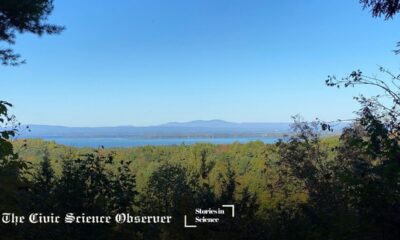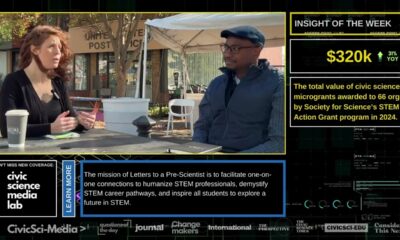Stories in Science Special Series
Science Inspiration and Breaking the Mold – Mixing Fashion and Science

– Andrea Hadjikyriacou, Ph.D.-
[dropcap]E[/dropcap]ver since I was a young child, I knew I wanted to pursue science. In third grade, I vividly remember being excited for the new science text books/workbooks we would receive throughout the year. My favorite ones were the ones that focused on biology and astronomy. Thinking about planets and stars sparked my imagination in new ways. My strong interest in space was partnered with my passion for understanding the biology of living organisms and how we function.
As an elementary school student, I would play in the yard of our family’s little rented home. I would mix sand, rocks and dirt as I pretended to mix chemicals. My dad would help me set up my science experiments for the science fair, and it was always something unique and creative that the other kids didn’t do. Things like studying the effect of phototropism by growing a small lentil plant and turning it upside down, or creating a water filtration device using sand and different rock sizes. It was really cool and exciting as a kid to see these things in real life.
In addition, in elementary school, one of the highlights that made me really excited for science was an experience with NASA. I was selected to ask a question to astronauts in the International Space Station when it was aligned above. It was an exhilarating experience: I only had 45 seconds to ask a question before the astronauts were out of range! I remember setting a dream to work for NASA in the future as a 12-year-old.

Andrea Hadjikyriacou
Fast forward to high school, my interests expanded into English Literature, Journalism, and Chemistry. I rose in ranks to be the editor-in-chief of the high school newspaper, and even received a passing grade on the advanced placement English Literature exam. But I also received a passing grade on the advanced placement Chemistry exam, and I fell in love with general chemistry. Other students hated Chemistry – it was one of the hardest courses in high school – but I loved those stoichiometric problems, the acid/base titration reactions, and chemical reaction formulas. I had a very supportive teacher, who saw my potential as a scientist, and always encouraged me to explore my interests and strengths. When I graduated high school, I thought I could only pick either writing or science for my career – not both.
Upon entering college, I undeclared; I wasn’t sure if I wanted to pursue science or journalism. I took some biochemistry and drug discovery classes that really swept me away; biology at my undergrad was too ecology focused which wasn’t what I was looking for, and the chemistry classes were too analytical. On the other hand, the writing classes were too bland to my liking. I found the perfect blend for my interests in biochemistry and molecular biology, which opened opportunities to conduct research in a laboratory as an undergraduate.
In the lab, I worked on an undergraduate thesis focused on the discovery of plant growth hormone pathway members. In the lab, I learned the basics of doing research, writing lab reports, writing summaries, keeping a lab notebook, optimizing protocols, sterile technique, and running circadian rhythm experiments. I remember having to collect samples every four hours as an undergraduate. I remember thinking it was ridiculous to have to come into lab at midnight and 4 am. Little did I know that this was preparing me for the hard work to come in grad school. I also never realized how much writing there is in science! I explored many options and switched gears during the summer.
I was fortunate to explore immunology and cancer during an industry internship program through my university. Being exposed to the research atmosphere at a biotech company really solidified my decision to go to graduate school – I wanted to further my knowledge in these fields and also be trained to ask the important questions to solve problems that have disease impact.
Instead of doubting yourself and listening to your fear, ask, WHY NOT!
I entered a PhD program in Biochemistry and Molecular Biology at UCLA and was completely overwhelmed at first. I was among the best of the best, and it was a humbling experience. It was hard to not compare yourself to others; other students would learn information faster; some were rock stars in the lab within their first rotation. During the first semester of grad school, we were required to take “Biochem Bootcamp” class, as we all called it. 10 weeks, 5 expedited courses, 5 final exams. It was unlike any other class I had taken in my academic career. By working hard, setting goals, and teaching myself as well as learning from others, I broke through my limiting beliefs and passed each module.
Working in the lab was also a different experience than my undergraduate research; graduate rotations taught me to be more of an independent thinker and researcher, and ask many questions. Once I selected my dissertation lab and research project, I quickly grew as a scientist, going through many ups and downs with my project, asking lots of questions, and becoming a truly independent researcher. I made mistakes, as everyone does, and learned from them – I didn’t let mistakes bring me down. I vividly remember one evening when I found myself alone in the lab at 9 pm. An experiment that I had spent weeks troubleshooting finally worked and I literally yelled out loud, “THIS IS WHY I LOVE SCIENCE!”
When I was finally at the stage of presenting my dissertation, I was in awe of all of the friends and colleagues supporting me. I even decided to live stream the defense on my blog’s Facebook page, and I was blown away that I had so many people watching it. I recall asking myself why I had decided to live stream one of the most stressful events of my grad career – my thesis defense. Even though I was very intimidated at first, my presentation flowed perfectly once I started talking. The whole thing was over before I knew it!
All of these experiences that have led me to where I am today taught me many lessons. The most important one is to not let anything or anyone force you to limit your goals because of fear. Instead of doubting yourself and listening to your fear, ask, WHY NOT! I also realized that to find amazing opportunities, you have to search for them yourself. No one is going to hand you an opportunity or job. Sure, your department and advisors can help you along the way. But in the end, you have to put in the work. Throughout a lot of my outreach in grad school, a big complaint I found among grad students was that they felt they weren’t aware of job opportunities or they weren’t being provided with enough information about alternative careers.
Something I always tell people is to be proactive, explore your interests, immerse yourself in multiple things outside of research, and see what piques your interest. It’s the only way to know if you’d enjoy something! I also strongly believe that nurturing students’ interest in STEM fields at a young age is critical. I truly believe that my interest and passion for science started in elementary school, and was further nurtured by my parents, the teachers/classes, and experiences.
Furthermore, I started my blog and science communication activities in the hope of breaking the stigma and stereotype that all scientists are un-relatable, awkward, and nerdy. I also wanted to show that not all scientists fit a single mold; there is so much diversity in STEM, and it is only ever growing and expanding. I want to show younger kids that you can be a multi-dimensional person with many interests, and still be involved in science; that you can be fashionable and love makeup and clothes, and STILL rock your research and science, which can be a welcome break from the reality stars and celebrities we see on television.
My blog was initially started as a hobby and an outlet when I needed an escape from science, where I could showcase my love for fashion and create stylish outfits I could wear in lab. It has since grown into a platform where I write about fashion, science, and advocate for important causes, all while still being heavily involved in doing research in the lab. I hope to continue to write, inspire, and advocate, while still contributing to the literature with my scientific findings during my post-doctoral fellowship in industry. No one knows what the future holds, I just know it will be bright. Maybe one day I will fulfill my dream of working for NASA!
Instagram: @phd_fashionista | Blog: www.phdfashionista.com | Twitter: @phd_fashionista | Facebook: facebook.com/phdfashionista| Image from Pixabay | CC0 Creative Commons
The CS Media Lab is a Boston-anchored civic science news collective with local, national and global coverage on TV, digital print, and radio through CivicSciTV, CivicSciTimes, and CivicSciRadio. Programs include Questions of the Day, Changemakers, QuickTake, Consider This Next, Stories in Science, Sai Resident Collective and more.

-
Audio Studio1 month ago
“Reading it opened up a whole new world.” Kim Steele on building her company ‘Documentaries Don’t Work’
-
 Civic Science Observer1 week ago
Civic Science Observer1 week ago‘Science policy’ Google searches spiked in 2025. What does that mean?
-
Civic Science Observer1 month ago
Our developing civic science photojournalism experiment: Photos from 2025
-
Civic Science Observer1 month ago
Together again: Day 1 of the 2025 ASTC conference in black and white
Contact
Menu
Designed with WordPress
























